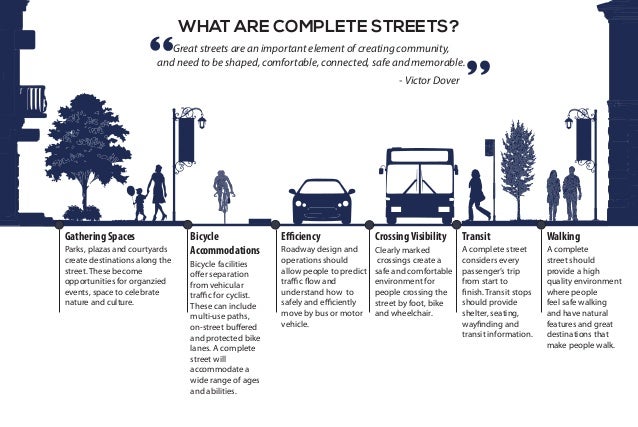Net Neutrality and Complete Streets
 |
| https://image.slidesharecdn.com/completestreetsopenhouseboards-161027165503/95/oct-19-complete-streets-open-house-boards-2-638.jpg?cb=1477587684 |
Imagine a city where the infrastructure--the roads, the sidewalks, the bike paths, the on-ramps and off-ramps--were all built so that every user, no matter who they are, has the ability travel with freedom and safety. In this city bicycles would have uninterrupted paths to get to where they need to go. Pedestrians would have uninterrupted sidewalks. And cars would be properly directed to appropriate places and speeds for them to travel. They may have to navigate intersections with each other but even those intersections would be designed with the safety and freedom of all users in mind. This is a city that would be a model of complete streets.
Plans for complete streets are infrastructure plans that care for all users. A city that is built with complete streets would be one designed from its outset to share space in such a way that all users had safety and freedom of movement. A city working to retro fit toward complete streets may have sidewalks that end precipitously, lack proper pads or shelters for folks waiting for the bus, or force bike riders on to unsafe streets or sidewalks in order to get where they need to go.
 |
| Shared streets in Graz, Austria. |
In the time before the car, city streets were for walking on or riding down with horses and eventually bicycles and trolleys. When the car was invented, it disrupted street life. As cars began to go faster they mixed less and less well with pedestrians, horses, and bicycles. Car manufacturers saw an opportunity to sell more cars and improve the experience of car owners by shifting public perception of for what and for whom city streets are designed.
 |
| See that nice green strip? Biktivists call that "kermit." Ribbit. Ribbit. |
Today as I lamented the FCC's decision to end net neutrality, I thought of the other ways my country's laws and norms are set up to value the needs, wants, and profits of those who can afford to pay a certain price for them. Does the woman pushing two young children in a stroller in sub-freezing temperatures deserve less access to safe and affordable transportation than the man who passed her in his Tesla? What sets them apart from each other? What really makes our neighborhoods happier and healthier? Our governments and by extension all of us make choices about whose needs will be the priority. We could make different choices.
 |
| https://www.mympo.org//images/PDF/Complete_Streets_Infographic.jpg |


Comments
Post a Comment